Tobias answer seems to be the ticket. Just wanted to add that I just realized the quantifier was meaningless in the character class. Also noticed a colleague's emails often have a space in front of the number and after the dollar sign, so some better regex is below (for US dollar amts):
RegExp.Pattern = "\$\s*([\,\d]*(?:\.\d{2})?)"
With some inspiration from this: What does a hyperlink range.start and range.end refer to? Came up with this:
Sub trueUpAttempt()
Dim OrigLength As Long
Debug.Print ActiveDocument.Characters.Count
Dim SelStart As Long
Dim SelEnd As Long
Dim SelLength As Long
Dim rHyperlink As Range
Dim wdHyperlink As Hyperlink
For Each wdHyperlink In ActiveDocument.Hyperlinks
Set rHyperlink = wdHyperlink.Range
'Debug.Print rHyperlink.Start
'Debug.Print rHyperlink.End
'Debug.Print rHyperlink.End - rHyperlink.Start
Debug.Print rHyperlink.End - rHyperlink.Start - Len(rHyperlink)
'there's got to be some way to true up the character offset, even if its ugly
Debug.Print ActiveDocument.Characters.Count + rHyperlink.End - rHyperlink.Start - Len(rHyperlink)
Next
End Sub
That's not a fix, but I think is an outline to reconcile the character offsets. This is all because word is counting all 62 characters in for example {HYPERLINK "http://www.smithany.com"} http://www.smithany.com
Edit 7-22-2023 attempting Tobais suggestion in reverse:
Sub DollarHighlighter2()
Set regExp = New regExp
Dim objMatch As Match
Dim colMatches As MatchCollection
Dim offsetEnd As Long
offsetEnd = Selection.End
regExp.Pattern = "\$([\,\d{1,3}]*(?:\.\d{2})?)"
regExp.Global = True
Set allMatches = regExp.Execute(Selection.text) ' Execute search.
For i = allMatches.Count - 1 To 0 Step -1
'MsgBox allMatches.Item(i)
ActiveDocument.Range(offsetEnd - allMatches.Item(i).FirstIndex, End:=offsetEnd - allMatches.Item(i).FirstIndex + allMatches.Item(i).Length).FormattedText.HighlightColorIndex = wdYellow
Next
End Sub
But this still seems to have a similar issue with links, and perhaps other content. I also tried the same Range determination forwards, but looping over matches in reverse and had similar problems.
Working link to example file here (no ssl): http://www.smithany.com/exampleDollarHighliter.docx
Original: I have seen several other StackOverflow posts such as this one: How to Use/Enable (RegExp object) Regular Expression using VBA (MACRO) in word on using regular expressions in Microsoft Word with VBA using the Microsoft VB script Regular Expressions 5.5 Reference.
That helped me prepare the following, which I use in Word to highlight US Dollar amounts:
Sub dollarHighlighter()
Set regExp = New regExp
Dim objMatch As Match
Dim colMatches As MatchCollection
Dim offsetStart As Long
offsetStart = Selection.Start
regExp.Pattern = "\$([\,\d{1,3}]*(?:\.\d{2})?)"
regExp.Global = True
Set colMatches = regExp.Execute(Selection.Text) ' Execute search.
For Each objMatch In colMatches ' Iterate Matches collection.
Set myRange = ActiveDocument.Range(objMatch.FirstIndex + offsetStart,
End:=offsetStart + objMatch.FirstIndex + objMatch.Length)
myRange.FormattedText.HighlightColorIndex = wdYellow
Next
End Sub
While this works as expected on a list of dollar amounts within text (for the most part - among its imperfections the regex is intentionally a bit loose) it does not work as anticipated when there are hyperlinks present in the Word document.
In that instance, there appears to be a shift in offset of the highlighted characters in a somewhat unpredictable manner. I assume this is because there is a lot of new xml/css in the document.xml source file.
Ultimately, my overarching questions is, can I use regex to highlight word document contents even if it contains hyperlinks? Is it an offset question or should I run the regex on the compressed xml, re compress and reopen for better results? As when I test various regex variations on the source code, I get the anticipated results, but not when formatting what would be the Word range.
I have also asked this here: https://social.msdn.microsoft.com/Forums/en-US/3a95c5e4-9e0c-4da9-970f-e0bf801c3170/macro-for-a-regexp-search-replace?forum=isvvba&prof=required but realize it was an ancient post...
Per question below, here are some possibly helpful links: an example document http://www.smithany.com/test.docx step 1 http://www.smithany.com/wordusd1.jpg Step 2 http://www.smithany.com/wordhighlighterrun.jpg and what happens http://www.smithany.com/whatactuallyhappens.jpg
Temporary Workaround: As suggested below Word's Wildcard find is fast if you do not stack the loops. try this:
Sub Macro2()
Selection.Find.ClearFormatting
Selection.Find.Replacement.ClearFormatting
Selection.Find.Replacement.highlight = True
With Selection.Find
.Text = "$[0-9,]{1,}"
.Replacement.Text = ""
.Forward = True
.Wrap = wdFindContinue
.Format = True
.MatchCase = False
.MatchWholeWord = False
.MatchAllWordForms = False
.MatchSoundsLike = False
.MatchWildcards = True
End With
Selection.Find.Execute Replace:=wdReplaceAll
Selection.Find.ClearFormatting
Selection.Find.Replacement.ClearFormatting
Selection.Find.Replacement.highlight = True
With Selection.Find
.Text = "$[0-9,]{1,}.[0-9]{2,3}"
.Replacement.Text = ""
.Forward = True
.Wrap = wdFindContinue
.Format = True
.MatchCase = False
.MatchWholeWord = False
.MatchAllWordForms = False
.MatchSoundsLike = False
.MatchWildcards = True
End With
Selection.Find.Execute Replace:=wdReplaceAll
End Sub
which basically gets all the dollar amounts highlighted. That said, complex expressions like matching a variety of date formats could get messy, but i suppose it is all possible doing them one step at a time.
